Prefixes are numbers or letters that can get added to a root word in other to change its meaning. There are a number of ways the prefixes show themselves in the English language. For example, having “un-” as part of the beginning of a root word. Like “apologetic” and “unapologetic.” These two words become polar opposites of each other (antonyms) when the prefix “un-” is added.
Let’s learn how prefixes work.
What is a Prefix?
One of the powerful tools of the English language, prefixes can modify existing words to create a new meaning.
Prefix Definition
A prefix is a letter or group of letters (or a word) added to the beginning of a word. Adding a prefix to a word makes a new word with a different meaning.
The word prefix itself has the prefix pre- (meaning before) placed before the word fix (meaning attach). Both are derived from the Latin language.
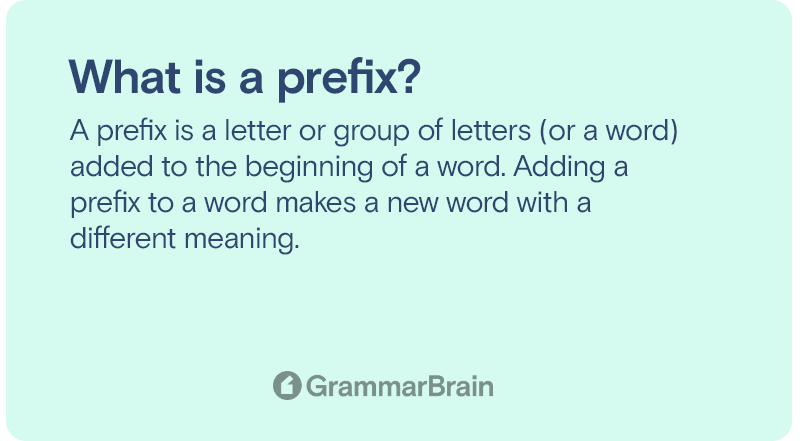
Difference between a Prefix and a Suffix
Prefixes and suffixes are parts of Affixes. Normally, a prefix or a suffix cannot stand on its own and needs to be affixed to a root word for proper meaning.
Here are the differences between a prefix and a suffix:
Prefix:
Added before a word
Changes the meaning of the word
Only one type
Suffix
Added at the end of a word
May change the meaning of the word or signify the tense or number of the word
Two types – derivational and inflectional
Why Are Prefixes Used?
Prefixes are used to make a word negative, indicate opinion, show repetition, or indicate position.
Prefix Grammar Rules
The use of prefixes is governed by a few grammar rules, including the following:
- If the prefix ends in a vowel (like a-) and the root word starts with a consonant, it is used as it is. (example: atypical)
- If the prefix ends in a vowel and if the root word also starts with a vowel, a consonant is added.
- The spelling of the word never changes. The prefix is simply added before the word.
- Double letters can occur. Examples: unnatural, irrational, misspell.
- A hyphen might be necessary at times. The following rules apply for using a prefix with a hyphen:
- Adding a prefix to a numeral or proper noun (Example: trans-America, mid-1930s)
- After the prefix re- to prevent any confusion or prevent misreading (Example: re-cover vs. recover)
- If the prefix ends with the same vowel as the word (Example: co-occur, pre-existed)
- Adding the prefix ex- implying former (Example: ex-secretary)
- Following the prefix self- (Example: self-respect, self-care)
List of Prefixes (with meanings and example sentences)
While there are several prefixes in the English language, here are a few commonly used ones.
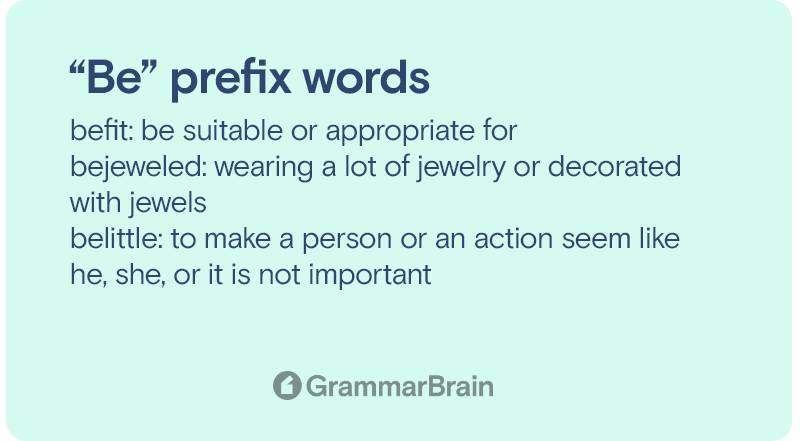
“Be” Prefix Words
befit: be suitable or appropriate for
Example: They offered him a post befitting his experience and seniority.
bejeweled: wearing a lot of jewelry or decorated with jewels
Example: The crown was richly bejeweled.
belittle: to make a person or an action seem like he, she, or it is not important
Example: We mustn’t belittle his outstanding achievement.
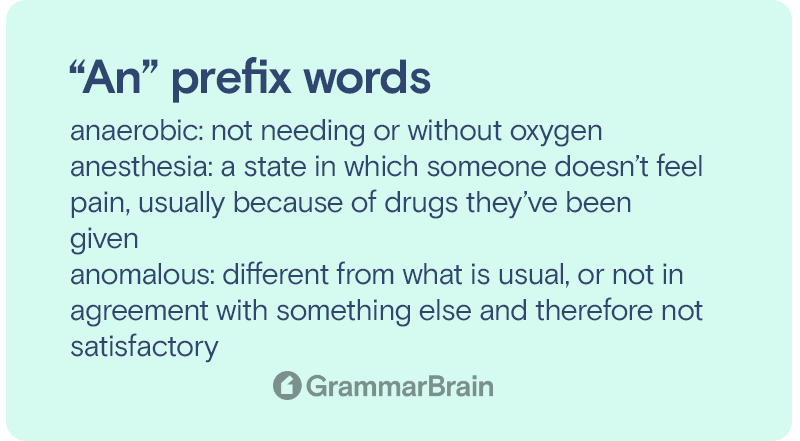
“An” Prefix Words
anaerobic: not needing or without oxygen
Example: Some microorganisms can only live in anaerobic conditions.
anesthesia: a state in which someone doesn’t feel pain, usually because of drugs they’ve been given
Example: The patient was given intravenous medication to induce anesthesia.
anomalous: different from what is usual, or not in agreement with something else and therefore not satisfactory
Example: For years, this anomalous behavior has baffled scientists.
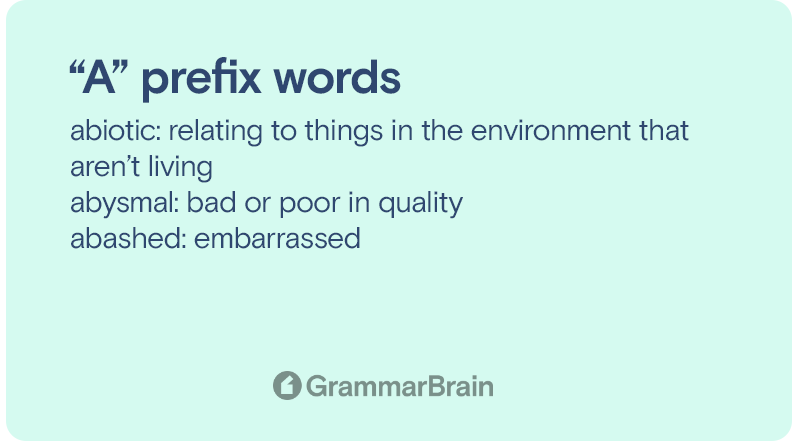
“A” Prefix Words
abiotic: relating to things in the environment that aren’t living
Example: Abiotic environments are the non-living factors of the environment that influence ecological systems.
abysmal: bad or poor in quality
Example: The food at the cafeteria was abysmal.
abashed: embarrassed
Example: When they all stood up and cheered, the young man was very abashed.
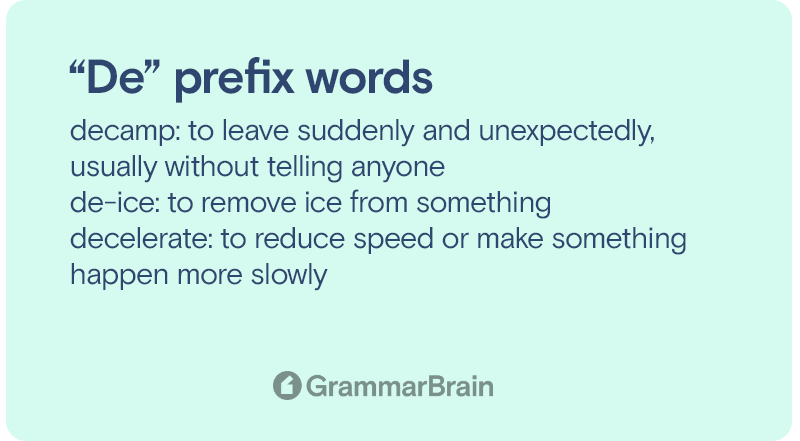
“De” Prefix Words
decamp: to leave suddenly and unexpectedly, usually without telling anyone
Example: He sold their furniture and decamped with the money.
de-ice: to remove ice from something
Example: The passengers watched as the plane was being de-iced before take-off.
decelerate: to reduce speed or make something happen more slowly
Example: The car slowly decelerated as it neared the exit on the highway.
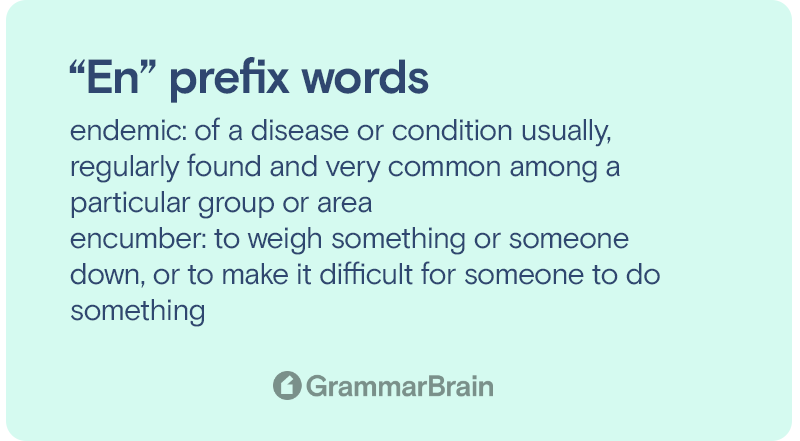
“En” Prefix Words
endemic: of a disease or condition usually, regularly found and very common among a particular group or area
Example: The poisonous reptile must have come from another place because it is not endemic to our nation.
encumber: to weigh something or someone down, or to make it difficult for someone to do something
Example: We were encumbered by our heavy coats and boots.
entangle: to cause something to become caught in something like ropes or a net
Example: She tried to get up, but her foot was entangled in the strap.
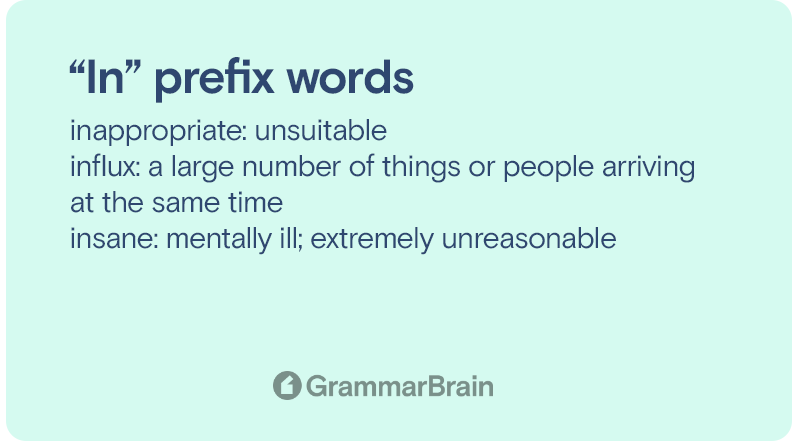
“In” Prefix Words
inappropriate: unsuitable
Example: His informal manner seemed completely inappropriate to the occasion.
influx: a large number of things or people arriving at the same time
Example: The city is preparing for a large influx of tourists this summer.
insane: mentally ill; extremely unreasonable
Example: He had this insane idea that he could get rich by selling old computers.
FAQs
What is the opposite of a prefix?
The opposite of a prefix is a suffix. While a prefix is added before the word, a suffix is added at the end of the word.
Prefixes that mean “one”
The prefixes mono-, mon-, and uni- (the variant of mono-) mean one.
- mono-
- monotone, monologue, monosyllable
- mon-
- monarch, monarchy
- uni-
- unilateral
What is the difference between a root word and a base word?
Root words and base words are often used as synonyms. At times, an English base word could be the same as a Latin root word.
However, there are some differences between root words and base words.
Root Word
Part of the base word that comes from other languages like Latin or Greek.
Can’t stand alone in English.
Example: aud is Latin and is the root of words like audition, audience, audio
Base Word
A basic word to which affixes (suffixes and prefixes) can be added.
Can stand alone.
Example: cycle is a full word in English derived from the root word cyc. With affixes, it becomes bicycle, tricycle, cyclist, cyclical
Which are the most common prefixes?
The most common prefixes are a-, be-, de-, dis-, ex-, in-, mis-, non-, over-, pre-, re-, uni-, and with-.
How do you know which prefixes to use?
Here are some common rules for some of the common prefixes:
1. Use in- for words starting with consonants and vowels (not for words starting with i or u).
2. Use ir- for words starting with r (example: irresponsible)
3. Use im- for words starting with m or p (example: immaculate, impossible)
4. Use il- for words starting with l (example: illogical, illegal)
5. Use un- for words starting with a consonant or vowel
Can a prefix have more than one syllable?
Can a word have only a prefix?
No. Prefixes are simply sets of letters that might have meanings of their own, but can’t stand alone. They must be attached to the beginning of another word and can change the meaning of the word.
What is the prefix “er” used for?
The prefix er- is also used to form verbs from adjectives.
Is “auto” and “bio” a prefix?
These are not, they are considered “combining forms.”
Sources
- What are the Differences between Prefix and Suffix? | by Education Help | Medium
- Prefix – Wikipedia
- Prefixes – Grammar – Cambridge Dictionary
- How To Use Common Prefixes And Suffixes | Thesaurus.com
- Learn How to Use Prefixes and Suffixes (eurocentres.com)
Inside this article
Fact checked:
Content is rigorously reviewed by a team of qualified and experienced fact checkers. Fact checkers review articles for factual accuracy, relevance, and timeliness. Learn more.
Core lessons
Glossary
- Abstract Noun
- Accusative Case
- Anecdote
- Antonym
- Active Sentence
- Adverb
- Adjective
- Allegory
- Alliteration
- Adjective Clause
- Adjective Phrase
- Ampersand
- Anastrophe
- Adverbial Clause
- Appositive Phrase
- Clause
- Compound Adjective
- Complex Sentence
- Compound Words
- Compound Predicate
- Common Noun
- Comparative Adjective
- Comparative and Superlative
- Compound Noun
- Compound Subject
- Compound Sentence
- Copular Verb
- Collective Noun
- Colloquialism
- Conciseness
- Consonance
- Conditional
- Concrete Noun
- Conjunction
- Conjugation
- Conditional Sentence
- Comma Splice
- Correlative Conjunction
- Coordinating Conjunction
- Coordinate Adjective
- Cumulative Adjective
- Dative Case
- Determiner
- Declarative Sentence
- Declarative Statement
- Direct Object Pronoun
- Direct Object
- Diction
- Diphthong
- Dangling Modifier
- Demonstrative Pronoun
- Demonstrative Adjective
- Direct Characterization
- Definite Article
- Doublespeak
- False Dilemma Fallacy
- Future Perfect Progressive
- Future Simple
- Future Perfect Continuous
- Future Perfect
- First Conditional
- Irregular Adjective
- Irregular Verb
- Imperative Sentence
- Indefinite Article
- Intransitive Verb
- Introductory Phrase
- Indefinite Pronoun
- Indirect Characterization
- Interrogative Sentence
- Intensive Pronoun
- Inanimate Object
- Indefinite Tense
- Infinitive Phrase
- Interjection
- Intensifier
- Infinitive
- Indicative Mood
- Participle
- Parallelism
- Prepositional Phrase
- Past Simple Tense
- Past Continuous Tense
- Past Perfect Tense
- Past Progressive Tense
- Present Simple Tense
- Present Perfect Tense
- Personal Pronoun
- Personification
- Persuasive Writing
- Parallel Structure
- Phrasal Verb
- Predicate Adjective
- Predicate Nominative
- Phonetic Language
- Plural Noun
- Punctuation
- Punctuation Marks
- Preposition
- Preposition of Place
- Parts of Speech
- Possessive Adjective
- Possessive Determiner
- Possessive Case
- Possessive Noun
- Proper Adjective
- Proper Noun
- Present Participle
- Prefix
- Predicate



